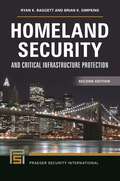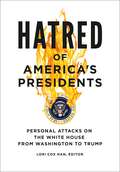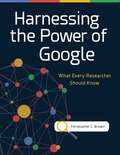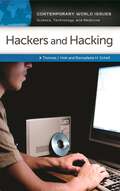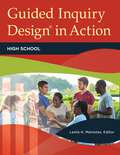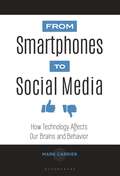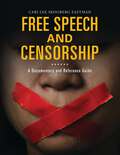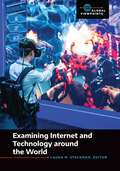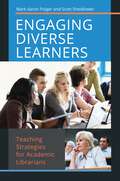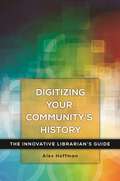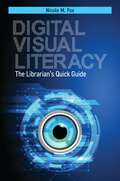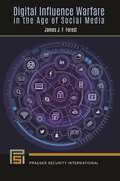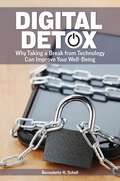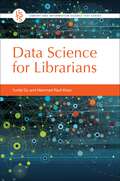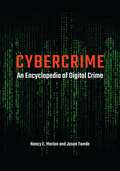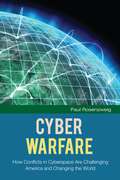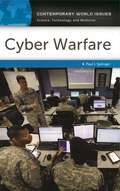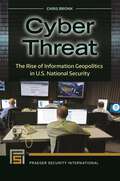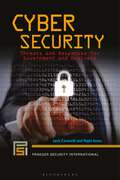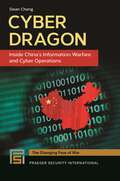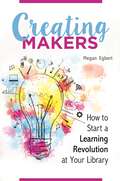- Table View
- List View
Homeland Security and Critical Infrastructure Protection (Praeger Security International)
by Ryan K. Baggett Brian K. SimpkinsA compelling overview of systems and strategies implemented to safeguard U.S. resources from a plethora of threats, the vulnerabilities and security gaps in these infrastructure systems, and options to enable the future security of the homeland.Since the first edition of this book was published in 2009, significant changes have occurred in the security landscape, both domestically and internationally. This second edition is thoroughly updated to reflect those changes, offering a complete review of the various security and resilience measures currently in place and potential strategies to safeguard life and property within the U.S. homeland. As noted in the U.S. Department of Homeland Security's National Preparedness Goal, the mission area of protection is vital to the homeland in its focus on actions to protect people, vital interests, and our nation's way of life. With that in mind, this book discusses strategies such as risk analysis and assessment, information sharing, and continuity planning. The authors focus on relevant and timely threats and hazards facing specific infrastructure components including, but not limited to, agriculture and food, banking and finance, water, energy, telecommunications, and transportation. The dynamic posture of critical infrastructure security and resilience (CISR) underscores the importance of an integrated, layered all-hazards approach. In describing this approach, the book includes new chapters on planning and guidance, public and private partnerships, cyber issues and threats, and careers in infrastructure protection. Additions such as discussion questions, learning objectives, and fundamental concepts for each chapter provide additional direction for instructors and students alike.
Hatred of America's Presidents: Personal Attacks on the White House from Washington to Trump
by Lori Cox HanThis work examines expressions of personal hostility and animosity toward presidents—even beloved ones—throughout American history and their impact on policymaking, politics, and culture.People involved or simply interested in politics often ask whether today's political environment is more toxic than ever before. Hatred of America's Presidents: Personal Attacks on the White House from Washington to Trump presents an impartial and authoritative history of invective toward the White House so readers can determine the answer for themselves.The book focuses on the most representative and commonplace attacks of a vitriolic and personal nature, detailing who instigated and trafficked in the attacks and how presidents, administrations, and political parties defended themselves. It also illustrates how honest disagreements about policy—such as FDR's New Deal, Ronald Reagan's Central America policies, George W. Bush's invasion of Iraq, and Barack Obama's Affordable Care Act—fueled expressions of hatred and condemnation. Finally, the book includes perspectives from both the right and the left on the legitimacy of these attacks and the victims' defenses as well as their impact on American politics and policy.
Harnessing the Power of Google: What Every Researcher Should Know
by Christopher C. BrownThis informative and practical book teaches how to get better and faster results from Internet searches and methods for maximizing the potential of the world's most popular search engine.Mastering Internet research skills is a must for today's information professionals and LIS students, as well as for educators and all high school and college students. But without specific instruction in how to conduct online research, people are destined to waste time in their Internet queries or to come up emptyhanded when the information they're seeking is, in fact, available. Harnessing the Power of Google: What Every Researcher Should Know offers simple strategies that streamline research and improve anyone's search results. It will specifically benefit information professionals, students, and academic researchers in disciplines like international studies, political science, and statistical research. Illustrated with helpful screen shots, this handbook will be an often-consulted desk reference and can serve as a workshop guide or supplementary reading in courses on online research skills.The book starts with a review of general guidelines for searching that covers topics like the difference between primary and secondary sources, determining authority, citing sources, indexing, and ranking before addressing Google's power-searching features, such as the ability to search by top-level Internet domain or file type. The book describes the history of information access over the past century, culminating in today's digital information archives and how Google now augments—not replaces—what libraries provide. The three Google interfaces that together comprise a powerful toolkit are covered in detail: Google Web for finding primary source materials; Google Scholar for full text searching of scholarly, peer-reviewed material; and Google Books for searching the full text of a very high percentage of books.
Hackers and Hacking: A Reference Handbook (Contemporary World Issues)
by Thomas J. Holt Bernadette H. SchellThis book provides an in-depth exploration of the phenomenon of hacking from a multidisciplinary perspective that addresses the social and technological aspects of this unique activity as well as its impact.What defines the social world of hackers? How do individuals utilize hacking techniques against corporations, governments, and the general public? And what motivates them to do so? This book traces the origins of hacking from the 1950s to today and provides an in-depth exploration of the ways in which hackers define themselves, the application of malicious and ethical hacking techniques, and how hackers' activities are directly tied to the evolution of the technologies we use every day.Rather than presenting an overly technical discussion of the phenomenon of hacking, this work examines the culture of hackers and the technologies they exploit in an easy-to-understand format. Additionally, the book documents how hacking can be applied to engage in various forms of cybercrime, ranging from the creation of malicious software to the theft of sensitive information and fraud—acts that can have devastating effects upon our modern information society.
Guided Inquiry Design® in Action: High School (Libraries Unlimited Guided Inquiry)
by Leslie K. ManiotesEdited by the cocreator of the Guided Inquiry Design® (GID) framework as well as an educator, speaker, and international consultant on the topic, this book explains the nuances of GID in the high school context. It also addresses background research and explains guided inquiry and the information search process.Today's students need to be able to think creatively to solve problems. They need to be in learning environments that incorporate collaboration, discussion, and genuine reflection to acquire these kinds of real-world skills. Guided Inquiry Design® in Action: High School gives teachers and librarians lesson plans created within the proven GID framework, specifically designed for high school students, and provides the supporting information and guidance to use these lesson plans successfully.You'll find the lesson plans and complete units of Guided Inquiry Design® clear and easy to implement and integrate into your existing curriculum, in all areas, from science to humanities to social studies. These teaching materials are accompanied by explanations of critical subjects such as the GID framework, using Guided Inquiry as the basis for personalized learning, using inquiry tools for assessment of learning in high school, and applying teaching strategies that increase student investment and foster critical thinking and deeper learning.
From Smartphones to Social Media: How Technology Affects Our Brains and Behavior
by Mark CarrierThis book examines how today's technology, as it includes smartphones, computers, and the internet, shapes our physical health, cognitive and psychological development, and interactions with one another and the world around us.Technology has become a ubiquitous part of modern life, but its impact on our physical, psychological, and social health and development runs just as deep as does our dependence upon it. How is the development of babies' brains affected by their playing with their parents' smartphones and tablets? How have computers altered the way we process and learn information? How have texting and social networking sites such as Facebook changed the way in which we interact with others? Can online dating lead to meaningful real-world relationships? From Smartphones to Social Media investigates these questions and many complex issues related to technology. Readers will discover what researchers know about how the use of technology affects us through accessibly written, thematic chapters. The main text is complemented by a collection of case studies and interviews with a variety of experts, providing insight into how technology's positive and negative effects manifest in our everyday lives and what we can do to mediate the negative ones.
Free Speech and Censorship: A Documentary and Reference Guide (Documentary and Reference Guides)
by Cari Lee EastmanThis annotated document collection surveys the history and evolution of laws and attitudes regarding free speech and censorship in the United States, with a special emphasis on contemporary events and controversies related to the First Amendment.The United States' collective understanding of First Amendment freedoms was formed by more than 200 years of tensions between the power of word and the power of the government. During that time, major laws and legal decisions defined the circumstances and degree to which personal expression could be rightfully expressed—and rightfully limited.This struggle to define the parameters of free speech continues today. Vibrant and passionate debates about First Amendment limitations once inspired by the dissemination of birth control information now address such issues as kneeling during the national anthem, removing controversial books from public libraries, attempts by the Trump administration to discredit the press, and disseminating false or hateful information through social media platforms. By exploring diverse examples of censorship victories and triumphs of free expression, readers will better understand the enormous impact of First Amendment freedoms on American society.
Examining Internet and Technology around the World (Global Viewpoints)
by Laura M. SteckmanThis book offers comparative insights into the challenges and opportunities surrounding emerging technology and the internet as it is used and perceived throughout the world, providing students with cross-cultural and cross-national perspectives.The United Arab Emirates has a national goal of colonizing Mars by 2117, and China seeks to modernize its entire manufacturing process to produce cutting-edge technologies and research advances by 2025. How are other countries using the internet and emerging technologies to their advantage? This volume in the Global Viewpoints series examines 10 issues pertaining to the internet and technology, including access and censorship, alternative energy technologies, artificial intelligence, autonomous robots, cyberbullying, cybercrime, e-learning, GMOs, online privacy, and virtual and augmented reality. For each topic, the volume features eight country-level perspectives that span the world to allow for comparisons of different nations' specific approaches to the technology or issue. This encyclopedia takes a new direction in understanding the importance and impact of emerging technologies on the world, showing that even when experiencing similar technologically related challenges or advances, these technologies do not form one-size-fits-all solutions for every nation and population. Even when nations develop similar technologies, human dimensions—from policy to social norms to culture—influence people and society across the world differently.
Engaging Diverse Learners: Teaching Strategies for Academic Librarians
by Mark Aaron Polger Scott SheidlowerThis book connects teaching practical strategies and ideas with educational theories to give you techniques to use in the classroom to capture students' attention and engage them with instruction.Drawing on the literatures of adult education and of teaching skills, Engaging Diverse Learners: Teaching Strategies for Academic Librarians presents a wide range of methods to improve how you teach. Coauthors Mark Aaron Polger and Scott Sheidlower argue that in order to grab–and hold onto—students' attention, instructors must get their interest right from the beginning. The techniques they suggest explain how to take into consideration the range of different learning styles students may have, how to accommodate students with different English language skills or abilities, and how to successfully work with individuals from different socioeconomic backgrounds or from different technologically adapted generations. The sections for each group address the key questions of identification (who are they?); how members of that group tend to react to libraries, librarians, and education; and how educational theories of that time affected students' learning in that generation.
Digitizing Your Community's History: The Innovative Librarian's Guide (Innovative Librarian's Guide)
by Alex HoffmanFollow the blueprint in this book to launch a library DIY community history digitization program—one that provides the access and fosters engagement with patrons to sustain the program over time.Internet technologies have enabled anyone to tell their story—and to find out their own unknown story. Libraries are seeing increased interest in community and family history and in genealogy, as well as heightened demand for access to personal and community history materials in digital format. The opportunity exists for libraries to benefit their communities by providing these in-demand, digitized historical materials optimized for researchers at the individual level. Digitizing Your Community's History: The Innovative Librarian's Guide provides you with step-by-step directions for launching a DIY digitization program for personal and community historical materials. It covers the process of setting up a digitization program, training customers to use the equipment, best practices for storing digitized material, and tips for engaging the community in local history, such as ideas for exhibiting materials and programs for genealogy and family history. Just as importantly, the author addresses how to explain the benefits of programs like these to library stakeholders and supplies recommendations on sustaining library community history programs through access and engagement. The book also provides supplemental materials that include templates and programming ideas, lists of recommended software and apps, and recommended specifications for equipment and for file storage.
Digital Visual Literacy: The Librarian's Quick Guide
by Nicole M. FoxDesigned to introduce visual literacy to instructional librarians, this book shows librarians how to make visual literacy relevant and engaging by framing it as a digital skill.Millions of images are uploaded to social media every day, and students are increasingly being asked to participate in such image-rich research projects as websites and blogs. Image manipulation and photo editing are commonplace, but the visual literacy skills needed to detect that kind of misinformation aren't.Students need help learning how to find, evaluate, and use images in an ethical and effective manner. Digital Visual Literacy is designed to introduce visual literacy to instructional librarians. This concise introduction teaches visual literacy as a digital skill, complete with digital humanities-based workshops and assignments to make instruction informative and engaging. It covers all aspects of visual literacy, from copyright to image evaluation. Each chapter clearly explains visual literacy standards and proficiencies and offers practical instructional assignments, in-class demonstrations, and more through the use of digital humanities tools.
Digital Influence Warfare in the Age of Social Media (Praeger Security International)
by James J. ForestThis timely book spotlights how various entities are using the Internet to shape people's perceptions and decision-making. It also describes detailed case studies as well as the tools and methods used to identify automated, fake accounts.This book brings together three important dimensions of our everyday lives. First is digital-the online ecosystem of information providers and tools, from websites, blogs, discussion forums, and targeted email campaigns to social media, video streaming, and virtual reality. Second, influence-the most effective ways people can be persuaded, in order to shape their beliefs in ways that lead them to embrace one set of beliefs and reject others. And finally, warfare-wars won by the information and disinformation providers who are able to influence behavior in ways they find beneficial to their political, social, and other goals.The book provides a wide range of specific examples that illustrate the ways people are being targeted by digital influencers. There is much more to digital influence warfare than terrorist propaganda, "fake news," or Russian efforts to manipulate elections: chapters examine post-truth narratives, fabricated "alternate facts," and brainwashing and disinformation within the context of various political, scientific, security, and societal debates. The final chapters examine how new technical tools, critical thinking, and resilience can help thwart digital influence warfare efforts.
Digital Detox: Why Taking a Break from Technology Can Improve Your Well-Being
by Bernadette H. SchellThis book discusses the dangers of too much technology use, explores the benefits of digital detoxing, and outlines the different programs and approaches available to help you unplug. It's an invaluable resource for readers looking to establish a healthier relationship with the digital world.Health professionals and the general public are becoming increasingly aware that addiction to the internet, social media, online games, and other forms of technology has become a real problem with significant negative impacts on physical, psychological, and social health. To combat this issue, some are now undertaking a "digital detox," and many options have emerged to help individuals unplug, whether for a weekend or for longer-term change.Digital Detox: Why Taking a Break from Technology Can Improve Your Well-Being explores both the dark side of technology's ever-present existence in today's world and what individuals can do to find better balance in their digital lives. Part I explores addiction to the internet and other novel technologies. What effect does overindulgence in social media, gaming, online shopping, or even "doomscrolling" through internet news sites have on our self-esteem, relationships with others, and happiness? This section also explores how researchers study and quantify technology addiction. Part II focuses on the digital detox countermovement, examining how various programs, support groups, retreats, and even technology itself can help individuals conquer their digital addictions.
Data Science for Librarians (Library and Information Science Text Series)
by Yunfei Du Hammad Rauf KhanThis unique textbook intersects traditional library science with data science principles that readers will find useful in implementing or improving data services within their libraries.Data Science for Librarians introduces data science to students and practitioners in library services. Writing for academic, public, and school library managers; library science students; and library and information science educators, authors Yunfei Du and Hammad Rauf Khan provide a thorough overview of conceptual and practical tools for data librarian practice. Partially due to how quickly data science evolves, libraries have yet to recognize core competencies and skills required to perform the job duties of a data librarian. As society transitions from the information age into the era of big data, librarians and information professionals require new knowledge and skills to stay current and take on new job roles, such as data librarianship. Such skills as data curation, research data management, statistical analysis, business analytics, visualization, smart city data, and learning analytics are relevant in library services today and will become increasingly so in the near future. This text serves as a tool for library and information science students and educators working on data science curriculum design.
Cybercrime: An Encyclopedia of Digital Crime
by Nancy E. Marion Jason TwedeThis important reference work is an extensive, up-to-date resource for students who want to investigate the world of cybercrime or for those seeking further knowledge of specific attacks both domestically and internationally.Cybercrime is characterized by criminal acts that take place in the borderless digital realm. It takes on many forms, and its perpetrators and victims are varied. From financial theft, destruction of systems, fraud, corporate espionage, and ransoming of information to the more personal, such as stalking and web-cam spying as well as cyberterrorism, this work covers the full spectrum of crimes committed via cyberspace.This comprehensive encyclopedia covers the most noteworthy attacks while also focusing on the myriad issues that surround cybercrime. It includes entries on such topics as the different types of cyberattacks, cybercrime techniques, specific cybercriminals and cybercrime groups, and cybercrime investigations. While objective in its approach, this book does not shy away from covering such relevant, controversial topics as Julian Assange and Russian interference in the 2016 U.S. presidential election. It also provides detailed information on all of the latest developments in this constantly evolving field.
Cyber Warfare: How Conflicts in Cyberspace Are Challenging America and Changing the World (The Changing Face of War)
by Paul RosenzweigThis book provides an up-to-date, accessible guide to the growing threats in cyberspace that affects everyone from private individuals to businesses to national governments.Cyber Warfare: How Conflicts In Cyberspace Are Challenging America and Changing The World is a comprehensive and highly topical one-stop source for cyber conflict issues that provides scholarly treatment of the subject in a readable format. The book provides a level-headed, concrete analytical foundation for thinking about cybersecurity law and policy questions, covering the entire range of cyber issues in the 21st century, including topics such as malicious software, encryption, hardware intrusions, privacy and civil liberties concerns, and other interesting aspects of the problem.In Part I, the author describes the nature of cyber threats, including the threat of cyber warfare. Part II describes the policies and practices currently in place, while Part III proposes optimal responses to the challenges we face. The work should be considered essential reading for national and homeland security professionals as well as students and lay readers wanting to understand of the scope of our shared cybersecurity problem.
Cyber Warfare: A Reference Handbook (Contemporary World Issues)
by Paul J. SpringerThis timely handbook traces the development of cyber capabilities from their roots in information warfare and cryptology to their potential military application in combat.Cyber warfare is gaining prominence as a serious tactic in military conflicts throughout the world. And, as the most network-dependent nation on earth, the United States is the most vulnerable. Military expert and author Paul J. Springer examines the many facets of cyber combat—from the threats of information exposure that American civilians encounter on a daily basis, to the concern of keeping up with the capabilities of China and Russia, to the inherent dangers in ignoring cyber threats. This essential reference—the only of its kind to include an overview of other cyber warfare literature—emphasizes the importance of cyber operations in modern conflicts, detailing the efforts that have been made by government agencies to create networks that are secure. Noted experts in the field weigh in on the problems of attribution during a cyber attack, the detection of cyber intrusions, and the possible solutions for preventing data breaches. The book features profiles of theorists, commanders, and inventors; as well as organizations dedicated to cyber attacks, including government and military operations, industrial cyber security companies, and academic centers.
Cyber Threat: The Rise of Information Geopolitics in U.S. National Security (Praeger Security International)
by Chris BronkThis book presents a holistic view of the geopolitics of cyberspace that have arisen over the past decade, utilizing recent events to explain the international security dimension of cyber threat and vulnerability, and to document the challenges of controlling information resources and protecting computer systems.How are the evolving cases of cyber attack and breach as well as the actions of government and corporations shaping how cyberspace is governed? What object lessons are there in security cases such as those involving Wikileaks and the Snowden affair? An essential read for practitioners, scholars, and students of international affairs and security, this book examines the widely pervasive and enormously effective nature of cyber threats today, explaining why cyber attacks happen, how they matter, and how they may be managed.The book addresses a chronology of events starting in 2005 to comprehensively explain the international security dimension of cyber threat and vulnerability. It begins with an explanation of contemporary information technology, including the economics of contemporary cloud, mobile, and control systems software as well as how computing and networking—principally the Internet—are interwoven in the concept of cyberspace. Author Chris Bronk, PhD, then documents the national struggles with controlling information resources and protecting computer systems. The book considers major security cases such as Wikileaks, Stuxnet, the cyber attack on Estonia, Shamoon, and the recent exploits of the Syrian Electronic Army. Readers will understand how cyber security in the 21st century is far more than a military or defense issue, but is a critical matter of international law, diplomacy, commerce, and civil society as well.
Cyber Security: Threats and Responses for Government and Business (Praeger Security International)
by Jack Caravelli Nigel JonesThis timely and compelling book presents a broad study of all key cyber security issues of the highest interest to government and business as well as their implications.This comprehensive work focuses on the current state of play regarding cyber security threats to government and business, which are imposing unprecedented costs and disruption. At the same time, it aggressively takes a forward-looking approach to such emerging industries as automobiles and appliances, the operations of which are becoming more closely tied to the internet. Revolutionary developments will have security implications unforeseen by manufacturers, and the authors explore these in detail, drawing on lessons from overseas as well as the United States to show how nations and businesses can combat these threats.The book's first section describes existing threats and their consequences. The second section identifies newer cyber challenges across an even broader spectrum, including the internet of things. The concluding section looks at policies and practices in the United States, United Kingdom, and elsewhere that offer ways to mitigate threats to cyber security. Written in a nontechnical, accessible manner, the book will appeal to a diverse audience of policymakers, business leaders, cyber security experts, and interested general readers.
Cyber Dragon: Inside China's Information Warfare and Cyber Operations (The Changing Face of War)
by Dean ChengThis book provides a framework for assessing China's extensive cyber espionage efforts and multi-decade modernization of its military, not only identifying the "what" but also addressing the "why" behind China's focus on establishing information dominance as a key component of its military efforts.China combines financial firepower—currently the world's second largest economy—with a clear intent of fielding a modern military capable of competing not only in the physical environments of land, sea, air, and outer space, but especially in the electromagnetic and cyber domains. This book makes extensive use of Chinese-language sources to provide policy-relevant insight into how the Chinese view the evolving relationship between information and future warfare as well as issues such as computer network warfare and electronic warfare. Written by an expert on Chinese military and security developments, this work taps materials the Chinese military uses to educate its own officers to explain the bigger-picture thinking that motivates Chinese cyber warfare. Readers will be able to place the key role of Chinese cyber operations in the overall context of how the Chinese military thinks future wars will be fought and grasp how Chinese computer network operations, including various hacking incidents, are part of a larger, different approach to warfare. The book's explanations of how the Chinese view information's growing role in warfare will benefit U.S. policymakers, while students in cyber security and Chinese studies will better understand how cyber and information threats work and the seriousness of the threat posed by China specifically.
Creating Makers: How to Start a Learning Revolution at Your Library
by Megan EgbertThis book shows you how, even with a tight budget and limited space, you can foster "maker mentality" in your library and help patrons reap the learning benefits of making—with or without a makerspace.Just because your library is small or limited on funds doesn't mean you can't be part of the maker movement. This book explains that what is really important about the movement is not the space, but the creativity, innovation, and resilience that go along with a successful maker program. All it takes is making some important changes to a library's programs, services, and collections to facilitate the maker mentality in their patrons, and this book shows you how. The author explains what a maker is, why this movement is important, and how making fits in with educational initiatives such as STEM and STEAM as well as with library service. Her book supplies practical advice for incorporating the principles of the maker movement into library services—how to use small spaces or mobile spaces to accommodate maker programs, creating passive maker programs, providing access to making through circulating maker tools, partnering with other organizations, hosting maker faires, and more. Readers will better understand their instructional role in cultivating makers by human-centered design thinking, open source and shared learning, and implementation of an inquiry approach.
Corporate Security Crossroads: Responding to Terrorism, Cyberthreats, and Other Hazards in the Global Business Environment
by Richard J. ChasdiEven though terrorism poses an increasing threat to multinational companies, corporate leaders can thwart attacks by learning to navigate the complexities of foreign governments, social unrest, and cultural dissonance.Multinational corporations are on the front lines of terrorism and cyberattacks—two of the world's biggest threats to global security. How can corporate leaders mitigate their organizations' risks and develop an infrastructure that detects and deters a security menace before it happens? This timely reference lays out essential political context and historical background to help executives identify contemporary threats and understand the interconnections between threat dynamics in an increasingly dangerous international environment.This compelling work is organized into seven chapters. The beginning chapters profile the specific risks for multinational companies and detail which global—and regional—factors might propagate violence targeted at American-based businesses. Next, two historical case studies on terrorist assaults at Tigantourine and Mombasa illustrate how counterterrorism can successfully thwart potential attacks against business targets. The final part describes industrial espionage and criminal activity and then outlines a corporate counterterror blueprint to combat the prospect of terrorism, providing specific recommendations for preventative measures.
Controlling Cyberspace: The Politics of Internet Governance and Regulation
by Carol M. GlenInformed by theories of international relations, this book assesses global political conflicts over cyberspace. It also analyzes the unique governance challenges that the Internet presents, both in terms of technical problems and control over content.The Internet is a resource of unparalleled importance to all countries and societies, but the current decentralized system of Internet governance is being challenged by some governments that seek to assert sovereign control over the technology. The political battles over governing the Internet—ones that are coming and conflicts that have already started—have far-reaching implications. This book analyzes the shifting nature of Internet governance as it affects timely and significant issues including Internet freedom, privacy, and security, as well as individual and corporate rights.Controlling Cyberspace: The Politics of Internet Governance and Regulation covers a broad range of issues related to Internet governance, presenting a technical description of how the Internet works, an overview of the Internet governance ecosystem from its earliest days to the present, an examination of the roles of the United Nations and other international and regional organizations in Internet governance, and a discussion of Internet governance in relation to specific national and international policies and debates. Readers will consider if access to the Internet is a human right and if the right to freedom of expression applies equally to the exchange of information online. The book also addresses how the digital divide between those in developed countries and the approximately 5 billion people who do not have access to the Internet access affects the issue of Internet governance, and it identifies the challenges involved in protecting online privacy in light of government and corporate control of information.
The Computer: A Brief History of the Machine That Changed the World
by Eric G. Swedin David L. FerroThis book, aimed at general readers, covers the entirety of computing history from antiquity to the present, placing the story of computing into the broader context of politics, economics, society, and more.Computers dominate the world we live in, and this book describes how we got here. The Computer: A Brief History of the Machine That Changed the World covers topics from early efforts at mathematical computation back in ancient times, such as the abacus and the Antikythera device, through Babbage's Difference Engine and the Hollerith Tabulating Machines of the 19th century, to the eventual invention of the modern computer during World War II and its aftermath. The scope of the text reaches into the modern day, with chapters on social media and the influence of computers and technology on recent elections.The information in this book, perfect for readers new to the topic or those looking to delve into the history of computers in greater detail, can be accessed both chronologically and topically. With chapters focusing on larger time periods as well as shorter subsections covering specific people and topics, this book is designed to make the history of computing as approachable as possible.
The Complete Guide to Open Scholarship
by Victoria MartinOffers librarians an authoritative overview of the full spectrum of significant issues and controversies related to open scholarship in a candid and fair-minded manner.There has long been a debate about openness in scholarship, and even the term itself continues to be debated. Openness is a complex and multidimensional concept, and its nature in scholarship continually evolves. One of the hindrances to the transition to greater openness in academia is this lack of clear understanding about how it fits into the practice of scholarly communication.To ensure that librarians as knowledge managers can better educate scholars about the benefits and challenges of open scholarship, Victoria Martin's The Complete Guide to Open Scholarship brings clarity to the concept of openness, tests assumptions concerning it, and strikes the right balance between breaking down complex ideas into simpler ones and honoring the reader's intelligence and previous knowledge of the subject. Readers will learn the history of openness in scholarship as well as several ways in which openness can be perceived. Drawing on specific examples, Martin discusses the most prominent scholarly models based on openness, barriers to openness, concerns about openness in scholarship, and the future of open scholarship.
